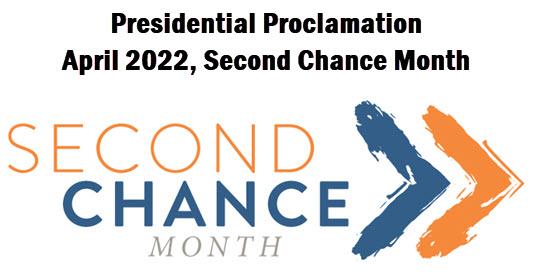Presidential Proclaimation – April 2022, Second Chance Month: Americans With Criminal Records See Hope
Posted April 14, 2022 07:15 am

WASHINGTON, DC – On March 31, 2022, President Biden issued a proclamation proclaiming April as Second Chance Month. President Biden said, "by supporting people who are committed to rectifying their mistakes, redefining themselves, and making meaningful contributions to society, we help reduce recidivism and build safer communities.”
As corporate America struggles with a labor shortage gap, some businesses are hiring individuals with criminal backgrounds to fill open job roles.
From the Presidential proclamation:
Every year, over 640,000 people are released from State and Federal prisons. More than 70 million Americans have a criminal record that creates significant barriers to employment, economic stability, and successful reentry into society. Thousands of legal and regulatory restrictions prevent these individuals from accessing employment, housing, voting, education, business licensing, and other basic opportunities. Because of these barriers, nearly 75 percent of people who were formerly incarcerated are still unemployed a year after being released.
Last year, approximately 40 major corporations and organizations created the Second Chance Business Coalition to expand employment opportunities for people with criminal records. Last month, Brian Lamb, Global Head of Diversity and Inclusion at JPMorgan Chase & Co., a Second Chance Business Coalition member, told CNBC that because of the labor shortage, “it’s going to require unconventional approaches” to hiring.
"In this challenging economic climate, businesses are doubling down on their efforts to ensure that the potential of Americans with a criminal record is not left on the sidelines. We applaud the companies, large and small, who recognize second chance hiring as a catalyst for safer, stronger, and more prosperous communities and families," said Kate Trammell, Vice President of Advocacy at Prison Fellowship in a statement.
Prison Fellowship is the nation's largest Christian nonprofit serving prisoners, former prisoners, and their families with biblically-based programming focused on helping people become productive members of society again and ensuring they have access to quality education, housing, job training, and employment.
One of the organization's initiatives is pushing for occupational licensing reforms to help eliminate employment barriers for people with prior convictions. A state-issued occupational license is required to pursue many specialty careers, such as a real estate broker. Prison Fellowship backed such a reform measure that passed the state Senate in Oklahoma earlier this year. More than 35 states have adopted Ban the Box policies that remove discrimination barriers during the hiring process for job applicants with criminal records. [Florida has not "banned the box." - ed.]
As to whether second chance hiring programs work, statistics suggest they do. A report by the U.S. Chamber of Commerce finds employing formerly incarcerated individuals would increase Gross Domestic Product (G.D.P.), boost earning power, and reduce recidivism rates. Another survey found that 81% of business leaders and 85% of human resource professionals believe that employees with a criminal record “perform their jobs about the same or better than workers without criminal records.”
It is estimated that 77 million Americans have a criminal record, or 1 in 3 adults. And according to Prison Policy Initiative data, formerly incarcerated individuals are unemployed at a rate that is "higher than the total U.S. unemployment rate during any historical period, including the Great Depression."
----------------
This piece was reprinted by the Columbia County Observer with permission or license. Graphics added by the Observer.
